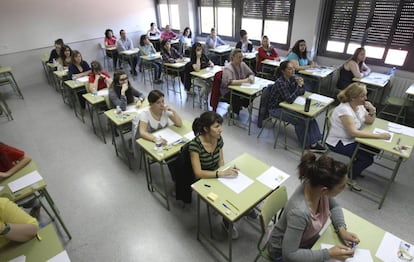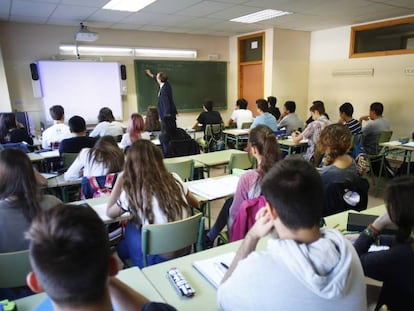Poor spelling rife among Spain¡¯s prospective teachers
Experts put the lack of literacy down to the use of social networks and the fact fewer young people read and write


In¨¦s Fern¨¢ndez-Ord¨®?ez, a member of the Spanish Royal Academy (RAE) and professor at the Autonomous University of Madrid, says that spelling mistakes are commonplace among her students. ¡°It¡¯s awful, but spelling errors are very common among my Philology students,¡± she says. ¡°Worse still, they don¡¯t know how to write. I think it¡¯s because they don¡¯t read. They lack practice in writing and dictation.¡±
Being able to write and speak well enables you to express your ideas better. It¡¯s not just a whim
Writer Julio Llamazares
In¨¦s¡¯s experience goes some way to explaining why 9.6% of the secondary school teaching posts remained empty after the relevant exams were sat by aspiring teachers last July. There have never been so many young people going through higher education in Spain ¨C 41% of 25- to 34-year-olds have a degree ¨C yet the spelling of graduates leaves much to be desired.
Former Education Minister Jos¨¦ Ignacio Wert from the Popular Party (PP) reintroduced the concept of dictation to the school curriculum in 2013 as part of the LOMCE education reforms. This echoed a similar move in France, which also put mental arithmetic back on the agenda.
Some experts believe reading is the best way to tackle the problem, but others argue that dictation focuses the mind, improves concentration and helps student think about potential errors.
Should students be failed?
There is an ongoing dilemma among teachers about failing students, not just for spelling, but in general because the Education Inspectorate is against it. Javier Herrera, from the Association of Andalusia High School Teachers, says that the monitoring authority makes decisions that fly in the face of academic criteria. Last year, the Association of Education Inspectors proposed in Congress allowing students to pass high school with one subject still hanging in the balance.
According to academic In¨¦s Fern¨¢ndez-Ord¨®?ez: ¡°If we were strict about this, a lot of people simply wouldn¡¯t pass. Levels have dropped. [Spanish philologist] Rafael Lapesa failed 60% of the class and nothing happened. But now it makes you a bad teacher.¡±
¡°I think many secondary teachers and sometimes university lecturers ignore the spelling mistakes in exams if the content is correct,¡± says Ignacio Bosque, a language professor at Madrid¡¯s Complutense University. ¡°I don¡¯t. It¡¯s a mistake. Nor do I agree with ignoring serious errors of expression. Some teachers think that the mistakes will be corrected by word processors and that syntax is not that important. I believe the opposite to be true. My teacher, Fernando L¨¢zaro Carreter, said that if the way something is expressed is poor, then the content inevitably will be too.¡±
Academic Carme Riera doesn¡¯t let her Literature students off with the ¡°many mistakes¡± they make at the Autonomous University of Barcelona. ¡°People don¡¯t follow the rules in spelling ¨C often their phones or emails correct the mistakes for them and they don¡¯t even notice,¡± she says, adding that the influence of English on the Spanish language has had a ¡°devastating¡± and ongoing effect.
History teacher Javier Herrera, from the Association of Andalusian High School Teachers, recognizes that spelling mistakes surface in all subjects and that all the teachers should get together to come up with a solution.
With the LOMCE reforms, primary pupils now receive 20% more Spanish Language class time and experts suggest that this might be the age to tackle the issue head on. ¡°We can tell straight off which school the [primary] student comes from according to his or her maturity in this area,¡± says Herrera. ¡°We can tell if they have had a teacher who has put emphasis on getting them to write well.¡±
The prestige of language
¡°It¡¯s not just about more language classes,¡± says writer Julio Llamazares. ¡°It¡¯s also to do with the social prestige of expressing yourself well and writing well. And the problem arises because many young people deliberately write badly on social networks because if they don¡¯t they¡¯ll be seen differently.¡±
9.6% of secondary school teaching posts were left unfilled
In the most recent exams for teaching posts in secondary schools, professional training colleges and language centers, sat by 200,000 candidates, the use of abbreviated words ¨C tb for tambi¨¦n?(also) or pq for porque (because) ¨C and also colloquial phrases were pervasive.
In Madrid, the academies that were preparing students for the exam warned them that they would lose 0.10 points for each abbreviation or for putting a forward slash at the end of an adjective to indicate an adverb such as completa/ (completely), which is how they might take their notes in class. ¡°If you are not able to use the proper writing tools, you will end up impoverishing your thinking or at least how you express it,¡± says Llamazares. ¡°Being able to write and speak well enables you to express your ideas better. It¡¯s not just a whim.¡±
The Education Ministry is set on reforming the exam system for civil servant positions, including teaching posts, after the last exam results left 1,984 vacancies unfilled. But the regions publish the criteria by which these exams are graded and only then does the board of judges have the power to add extra criteria such as marking down for spelling mistakes. ¡°I think it¡¯s right that [good spelling] should be required from aspiring teachers,¡± says Fern¨¢ndez-Ord¨®nez. ¡°We should be demanding a lot from secondary teachers, which is something that perhaps hasn¡¯t been done for some years.¡±
English version by Heather Galloway.
Tu suscripci¨®n se est¨¢ usando en otro dispositivo
?Quieres a?adir otro usuario a tu suscripci¨®n?
Si contin¨²as leyendo en este dispositivo, no se podr¨¢ leer en el otro.
FlechaTu suscripci¨®n se est¨¢ usando en otro dispositivo y solo puedes acceder a EL PA?S desde un dispositivo a la vez.
Si quieres compartir tu cuenta, cambia tu suscripci¨®n a la modalidad Premium, as¨ª podr¨¢s a?adir otro usuario. Cada uno acceder¨¢ con su propia cuenta de email, lo que os permitir¨¢ personalizar vuestra experiencia en EL PA?S.
?Tienes una suscripci¨®n de empresa? Accede aqu¨ª para contratar m¨¢s cuentas.
En el caso de no saber qui¨¦n est¨¢ usando tu cuenta, te recomendamos cambiar tu contrase?a aqu¨ª.
Si decides continuar compartiendo tu cuenta, este mensaje se mostrar¨¢ en tu dispositivo y en el de la otra persona que est¨¢ usando tu cuenta de forma indefinida, afectando a tu experiencia de lectura. Puedes consultar aqu¨ª los t¨¦rminos y condiciones de la suscripci¨®n digital.










































